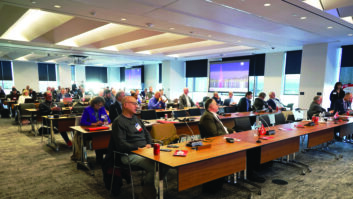A rare, complete radio broadcast of the 1920s across the Atlantic. Fibber McGee’s closet, opening for the first time. Mayor LaGuardia reading the comics. A thousand of the Gipper’s radio broadcasts.
These milestones are now part of the National Recording Registry.
The Librarian of Congress this week named 25 additions; the library identifies such a list each year, by law, to help preserve the country’s aural history.
It also is identifying and preserving existing versions to be housed in the library’s big new preservation facility in Culpeper, Va., which we told you about here when it opened.
Librarian James H. Billington said in the announcement, “Audio preservation constitutes a critical challenge. Much has already been lost, particularly in the field of radio.”
Also included are a number of seminal musical recordings, from Kitty Wells to Michael Jackson; the “Sounds of Earth” disc prepared for the Voyager spacecraft; and other notable audio. You can nominate suggestions for next year’s list at the NRPB Web site (www.loc.gov/nrpb/).
The 1925 orchestral broadcast was considered a “technological breakthrough.” According to the library, it originated in London, traveled by land line to station 5XX in Chelmsford, crossed the Atlantic where it was picked up by an RCA transmitter in Maine, and was relayed to stations WJZ in New York and WRC in Washington, D.C. The 37-minute broadcast survives on discs in the collections of the University of Maryland’s Library of American Broadcasting.
Here’s the list:
- “The First Trans-Atlantic Broadcast (March 14, 1925)
- “Allons a Lafayette,” Joseph Falcon (1928)
- “Casta Diva,” from Bellini’s “Norma”; Rosa Ponselle, accompanied by the Metropolitan Opera Orchestra and Chorus, conducted by Giulio Setti. (December 31, 1928 and January 30, 1929)
- “If I Could Hear My Mother Pray Again,” Thomas A. Dorsey (1934)
- “Sweet Lorraine,” Art Tatum (February 22, 1940)
- Fibber’s Closet Opens for the First Time, “Fibber McGee and Molly” radio program (March 4, 1940)
- Wings Over Jordan, Wings Over Jordan (1941)
- Fiorello LaGuardia reading the comics (1945)
- “Call it Stormy Monday but Tuesday is Just As Bad,” T-Bone Walker (1947)
- Harry S. Truman speech at the 1948 Democratic National Convention (July 15, 1948)
- “The Jazz Scene,” various artists (1949)
- “It Wasn’t God Who Made Honky Tonk Angels,” Kitty Wells (May 30, 1952)
- “My Fair Lady,” original cast recording (1956)
- Navajo Shootingway Ceremony Field Recordings, recorded by David McAllester (1957-1958)
- “‘Freight Train,’ and Other North Carolina Folk Songs and Tunes,” Elizabeth Cotten (1959)
- Marine Band Concert Album to Help Benefit the National Cultural Center (1963)
- “Oh, Pretty Woman,” Roy Orbison (1964)
- “Tracks of My Tears,” Smokey Robinson and the Miracles (1965)
- “You’ll Sing a Song and I’ll Sing a Song,” Ella Jenkins (1966)
- Music from the Morning of the World,” various artists; recorded by David Lewiston (1966)
- “For the Roses,” Joni Mitchell (1972)
- “Headhunters,” Herbie Hancock (1973)
- Ronald Reagan Radio Broadcasts (1976-1979)
- “The Sounds of Earth,” disc prepared for the Voyager spacecraft (1977)
- “Thriller,” Michael Jackson (1982)












